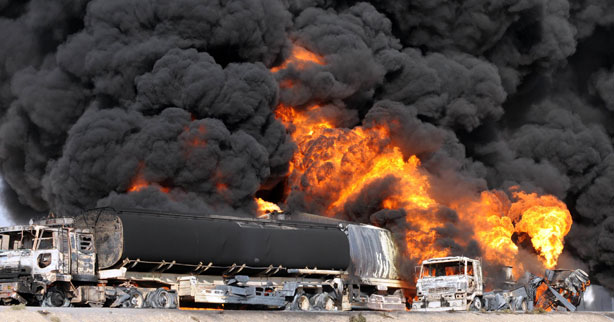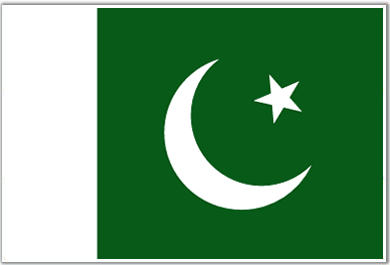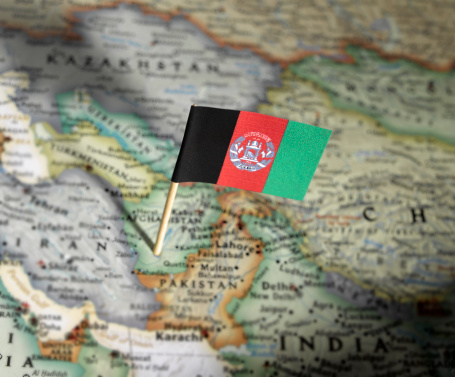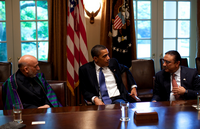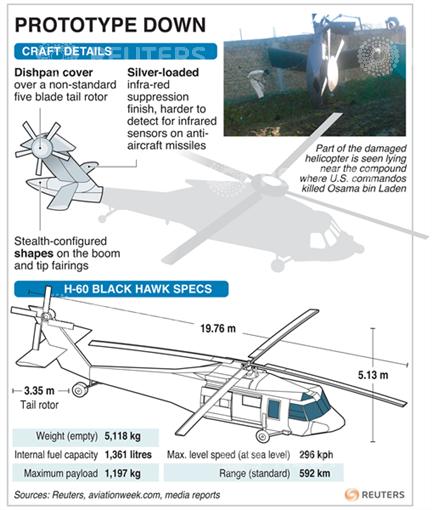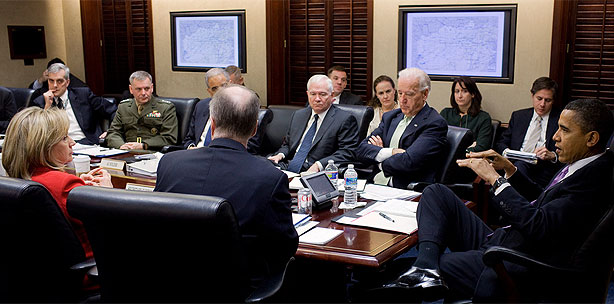
Piece by K. Subrahmanyan, a name you might recognize from his frequent publications.
From his Wikipedia entry:
K. Subrahmanyam (Tamil:கிருஷ்ணசுவாமி சுப்பிரமணியம், born 1929) is a prominent international strategic affairs analyst, journalist and former Indian civil servant. Considered a proponent of Realpolitik, Subrahmanyam has long been an influential voice in Indian security affairs. He is most often referred to as the doyen of India's strategic affairs community, and, more contentiously, as the premier ideological champion of India's nuclear deterrent.
Somewhat unsurprisingly, Subrahmanyam takes the "G2" approach, assuming the zero-sum outcome for India and the rest of the world. Nothing could be further from the truth, but one must expect this sort of response.
The Sino-American relationship is central to globalization's success or failure--hard to deny that. That relationship is not in good shape right now, for a lot of reasons. Trying to address that cluster of macro-imbalances is a worthy goal, but such effort does not--on the face of it--automatically insinuate the creation of G2, and when that charge is so reflexively slung, you have to say that it tells us more about the provider of the feedback (as in, this is how this proposal makes me feel!) than the effort itself.
It is certainly in some people's best interests to keep the U.S. and China at odds, but I honestly don't believe that to be the case for India, when the facts and trends are viewed objectively.
From his piece ("The return of G-2"), I limit the exerpts more to his commentary than his recitation of the proposal, which--of course--is a work in progress and is already significantly altered as we receive significant feedback here in Beijing. Suffice it to say, nobody here in Beijing is interested in "G2," even as they are highly interested in a more productive relationship with the U.S.
Even as President Obama and Prime Minister Manmohan Singh talked of a 21st century world order based on their shared values as leaders of the world’s two largest democracies, a newspaper run by the Chinese Communist Party published a plan for an alternative world order, based on a mutuality of interests between China and the US. It asserted, though, that the article, in the November 22 edition of People’s Daily Online, represented only the views of the authors — who include John Milligan-Whyte and Dai Min, authors of China and America’s Leadership in Peaceful Coexistence, and Thomas P.M. Barnett, the author of The Pentagon’s New Map, and leading Chinese policy experts.
The article describes the benefits of the grand strategy they propose: “[it] will promote US economic recovery, increase US exports to China, create 12 million US jobs, balance China-US trade as well as reduce US government deficits and debt. Furthermore, it will stabilise the US dollar, global currency and bond markets. It will also enable reform of international institutions, cooperative climate change remediation, international trade, global security breakthroughs . . .
There is no doubt that while this is not a formal proposal from Chinese official circles; this is kite-flying, to test public reaction in the US. It is possible that the idea is to suggest that the US and China can accommodate each other to mutual benefit — and China shares the US view that a war between two such powers in the 21st century would not make sense. It also holds out certain assurances that China will accommodate the US’s concerns on Southeast Asia as well as on North Korean and Iranian proliferation, provided the US reciprocates on Taiwan, Tibet, Xinjiang, and human rights. The US must also forget down its desire for regime change in North Korea and Iran. And, in return for the US lifting its high-technology trade ban, China will invest $1 trillion in the US, presumably in new technologies, as well as help in balancing trade and enabling the US to manage debt reduction.
But the glaring gap in the proposals is that there is no mention of Pakistani proliferation and Pakistani sponsorship of terrorism. While all the other issues listed by China are important to the US, casualties are being incurred by the US on the Pakistan front, and the US homeland is under threat from Pakistani terrorist organisations that are fielded by the Pakistan army behind the nuclear-missile deterrence shield that China provides to Islamabad. This may have one of two implications: either Pakistan, unlike North Korea and Iran, is not under Chinese influence; or Pakistan, in Chinese strategic interests, is a non-negotiable factor.
There is also no mention of US interests in India — even after the development of the Indo-US strategic partnership. Does this mean that China hopes to wean the US away from its strategic partnership with India, as part of the price for the deal? Or do they hope to frighten India into a non-aligned submission to China’s hegemony over the mainland of Asia (less Asean)?
China’s, and the authors’, value systems are evident from their advocacy that such a Sino-US deal should be outside the purview of the US Congress purview: they say it should be “agreed upon by the presidents of both nations through an ‘executive agreement’ not subject to US Senate ratification.” Surely, now that these ideas have been publicised, the present US president — with two years to go before seeking re-election — will find it difficult to move in this direction, as there will be accusations of his selling out to China.
It is also clear that there are sections in China who are of the view that, just as the US helped China’s rise to second position in the world so that its resources and cheap labour could benefit US multinationals and US consumers — both by way of cheap consumer goods and credit expansion in the US — now the US will help China by releasing high technology, and thereby help themselves, benefiting through job creation and debt reduction. And once China has access to US high-tech, its demographic advantage over the US will ensure it will become the superior knowledge power this century.
A significant number of people in this country imagine that there is an adversarial equation and a conflict of interest between China and the US, and thus, it will benefit India to be non-aligned. This article — published, significantly, on the eve of Prime Minister Wen Jiabao’s visit to India and Pakistan — holds out the possibility that China thinks it is possible to use the US to attain hegemonic power. Let us wake up to reality!
What to say?
First, the non-inclusion of the Pakistan-India dyad hardly amounts to signaling any desire to leverage this relationship to their collective or singular advantage or disadvantage. It simply reflects the reality that when people on both sides of the Sino-American dialogue speak to its ups and downs, those issues aren't considered central. Important? Sure. But not central. No one is saying that Pakistan and/or India constitute the core of what's wrong or going wrong with the Sino-American relationship right now. Reflective of it, perhaps, but not among its primary causes.
Noting the suggestion that the proposal be done as an executive agreement (longstanding practice of U.S. presidents for such matters) hardly suggests something extra-constitutional or politically devious. Just the opposite! It says we see no purpose in suggesting something on the level of a treaty requiring Senate ratification. None of this is intended as "law of the land"-caliber stuff: we simply come to certain understandings that allow an economic rebalancing to proceed. That is classic, within-the-president's-foreign-policy-purview stuff. Suggesting otherwise is sheer ignorance of how our political system works and has worked for decades. The economic rebalancing itself would need some political direction from above, but it would be overwhelmingly a private-sector-driven affair. If you're a U.S. business and don't want any investment from Chinese companies, then don't ask for any and none could ever be forced upon you. From the Chinese side, they simply will not enter into alliances or treaties implying any such commitment, so no sense in supposing such grandiose mechanisms are useful here.
It's as simple as that.
Yes, you will get some of this, "the Chinese will own America" fear-factor, but if majority ownership is out of the question (and we don't suggest that--just the opposite), then the question becomes, Should Chinese money flowing into America be used to facilitate even more public debt and welfare payments or should it be put to use putting Americans to work?
I honestly believe that it's much easier to argue that China does a great job of destroying America's competitiveness by enabling our addiction to federal debt right now than it does by being stubborn on the renminbi's value. History (especially past history with Japan) tells us that revaluing the RMB will not solve our trade deficit with China. We also screw ourselves by restricting high-tech exports to China due to military concerns, because they simply turn around and buy the same from the EU (like most such sanction efforts, we only hurt ourselves in this globalized economy, achieving nothing on the security side). But somehow we've let ourselves be convinced that China's potential military threat outweighs all such considerations--as if Mutual Assured Destruction somehow gets invalidated in the process! To me, that's just nuts, or--put more prosaically--bad leadership in Washington.
Again, the proposal is driven by a simple logic: There is a profound imbalance of easily-accessible investment capital in the world system right now. China's got a ton and America (and Europe) are somewhat starved by comparison and wracking up unsustainable public-sector debt that is already causing default crises in the EU, soon to be followed by some variant at lower levels of US government (cities, states). You can judge that dynamic from a lot of angles, but just to say, "Ahah! Now China has the West in its grips!" is rather silly. China presses its temporary advantage too much in the short term and all those trillions can end up being worth nothing. Business is about parties and counterparties--as in, you need two to tango.
Judged objectively, China has let in a lot of foreign direct investment over the past two decades, to the point where majority portions of its exports in certain sectors are actually controlled by foreign firms! Imagine the U.S. putting up with that?
On the other hand, it's clear that the U.S. has shouldered the bulk of the global policing role over the past two decades.
So in both instances, we need something more balanced, more reasonable, and more sustainable.
This proposal simply begs the question: if such rebalancing is necessary, what would the nature of such transactions look like if they weren't simply conducted according to America's preferred outcomes but actually reflected a compromise between the U.S. way and world vision and the Chinese way and world vision?
I know, I know. This is kowtowing to those communist Chinese! But more seriously, didn't we just try a long stretch of my-way-or-the-highway BS with Bush-Cheney? And how well did that work?
How anybody can feel threatened by such dialogue is beyond me, given the seriousness of the current imbalances in the world system and how their solution is in everybody's best interest. Again, let's get our inner FDR on and have some faith in who we are and stop being such wimps on dealmaking. Our inability to motivate ourselves beyond sopho-moronic internal arguments is our greatest weakness right now. Oooh wee! The GOP just nailed Obama on tax cuts! So now we get to extend unemployment benefits while refusing to pay for it. What a fab signal to send the world!
Honestly, the immaturity factor in Washington right now is almost unbearable to witness. It's just so embarrassing to endure when you travel abroad--especially in China. How can we be taken seriously when we act this way? We are just kidding ourselves if we think no one takes note.
India cannot want a U.S. and P.R.C. turning on each other and destroying globalization in coming years, because India cannot possibly prosper in that environment. You can say, such a bad thing would never happen, but to me, this is a head-in-the-sand sort of optimism.
The Global Financial Crisis does not disappear simply because of the somewhat successful (less in West, more in East) public-sector stimulus push in the initial phase. Much of the crisis's underlying causes are simply transmuted into the current/looming sovereign debt crises that worry so many leaders and--quite frankly--a decent chunk of the American middle class as captured in the Tea Party anger (which you can ridicule at your own risk, because history says that, when the U.S. middle class ain't happy, ain't nobody gets to be happy in our political system).
You can also say, China is right to lecture America now on its bad economic behavior. But such lecturing gets both sides--and the world--nowhere. For China to expect all the adjustment to happen now solely on America's side is unreasonable, just as unreasonable as the U.S. expecting somehow that all the adjustments should be on China's side.
But the dialogue, as it current stands, consists of both sides talking past each other and hoping that--somehow--this all balances out on its own over time. I think such a mindset it truly naive. Both sides have plenty of incentives and reasons not to budge, leaving both with increasingly unpleasant tools/weapons for seeking redress. I think that pathway is a bad one, and so I got together with the Center for America-China Partnership to change the conversation.
Such an attempt can be criticized from numerous angles, and the Indian Express piece offers one such angle. But we've got to get over the fear of exploring real solutions with real compromises and real adjustments on both sides--simply because it will make others around the world nervous. That would be the opposite of global leadership, which both countries owe the world right now.
Personally, I will always be warned not to get involved in this sort of manner, because it will cost me my credibility as a strategic thinker. My response to that logic is, What is the use of being a credible strategic thinker if all you do is sit on the sidelines at such moments? I hope to leave behind six kids who'll need a strong America and stable world to live and work and prosper within. I see no reason to amass a reputation (such as it is!) that can suffer no risks. Geez, anybody who knows me knows how much I like being an unreasonable troublemaker!
I have no fear of altering my positions and vision to fit reality as it unfolds. I marry myself to as few core interest propositions as possible, because the more you accumulate, the more dead your thinking becomes. I want America at all times to succeed to the best of its ability in prospering and continuing to shape this world for the better. I think we do that better than anybody, but I also think our approaches have to change when success/failure stare us in the face (usually at the same time, as we now face the great success of our globalization process AND the addiction to cheap money created by the dollar's standing as reserve currency). I cannot, for example, logically argue for regime-change in NorKo right now like I did in 2004-05. The system wouldn't handle it well right now, the Sino-American relationship couldn't handle it right now, and there's just bigger fish to fry.
You see such vaunted and highly-respected figures like Krugman, Tom Friedman, Niall Ferguson and Zakaria expressing extreme alarm on all these same issues, so this is exactly the sort of nexus where strategic thinking that posits win-win scenarios has to be employed. Just this week on Zakaria's GPS, Ferguson raised the issue of the EU possibly needing a huge flow of Chinese capital down the road. So this proposal is in the right zip code even as we hammer out its weaknesses with a steady stream of sit-downs with Chinese experts this week in Beijing.
As for personal risks, you've got to get over that stuff (and yourself, quite frankly). I don't get 50 lives to test out various pathways for useful application of my ideas. I get this one, and this one has this big issue staring it right in the face right now, and so I participate with likeminded people in China--none of them perfect and all with their biases, but likewise all with their hearts in the right place. I'm still unduly Catholic: I prefer to sin first and seek forgiveness later.
I believe in having your own foreign policy and have said so many times on this blog. This is the point of being in the field in the first place. If I were good at following the command chain, I wouldn't have gotten fired from the Naval War College and I'd probably being living some quiet existence as a CIA analyst (the organization correctly turned me down in 1990 for having the "wrong personality type"!).
Frankly, this sort of bold scenario work is exactly why I linked up with Wikistrat. I want nothing better than to undermine conventional thinking at this point in history, because I believe it to be America's worst enemy in these tumultuous, system-shaping times (the second biggest danger being the lack of competent strategic-thinking counterparties around the world because we've so long been the only country blessed with the strategic means to encourage such strategic thought--a situation changing rapidly before our eyes).
Personally, I think this is the best time to be in this business--the best time since WWII.
 Wednesday, December 7, 2011 at 12:01AM
Wednesday, December 7, 2011 at 12:01AM 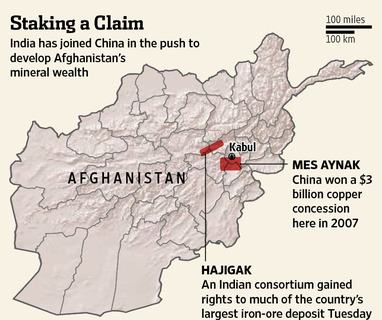
 Afghanistan,
Afghanistan,  China,
China,  India,
India,  Pakistan,
Pakistan,  US foreign policy | in
US foreign policy | in  Citation Post |
Citation Post |  Email Article |
Email Article |  Permalink |
Permalink |  Print Article
Print Article 








